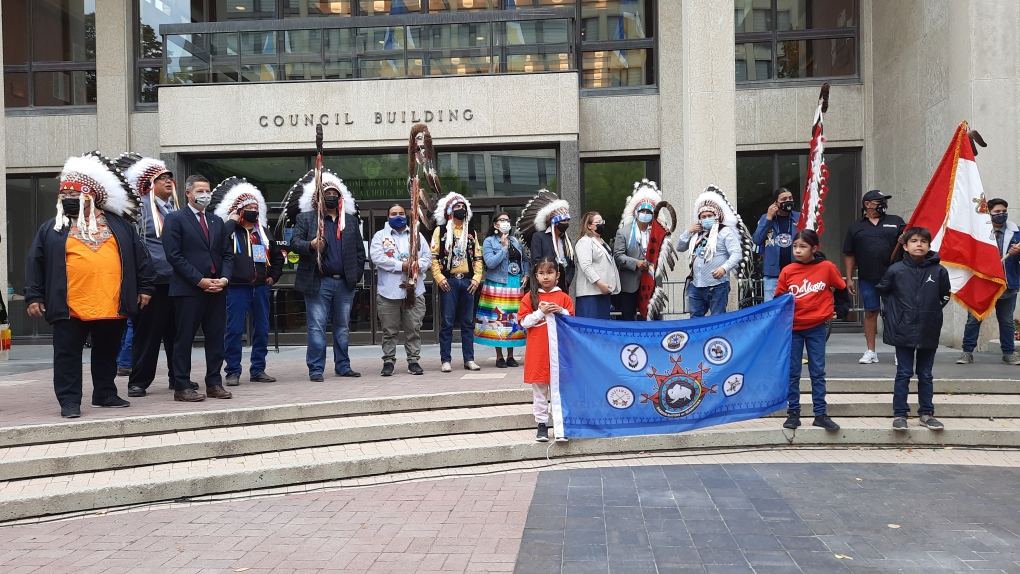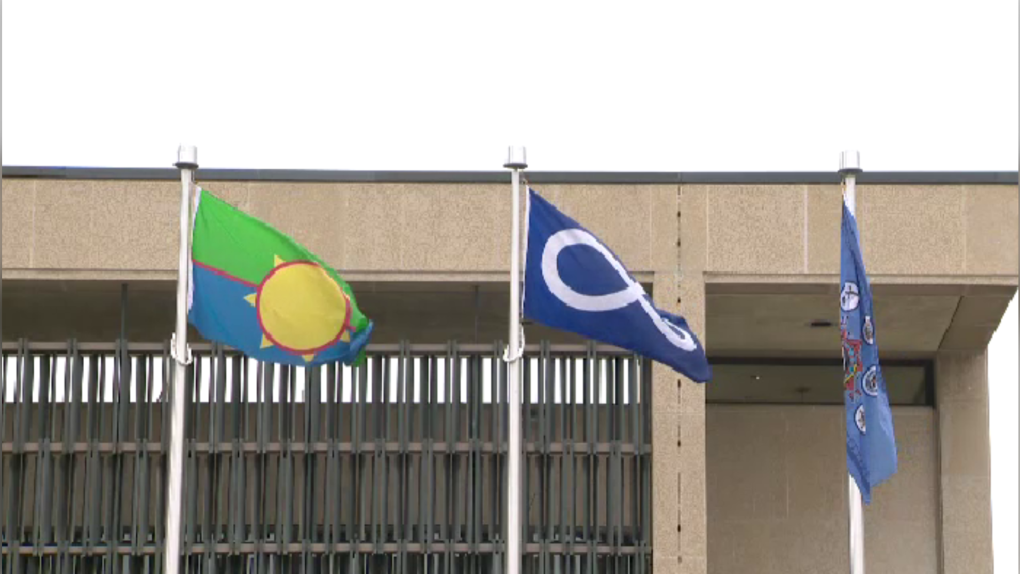'A truly significant moment': First Nations, Metis flags take permanent residency outside Winnipeg city hall
 Ceremonial flag raising at Winnipeg City Hall puts Dakota First Nations, Treaty One First Nations and Metis Nation flags on permanent display, Sept. 15 (Dan Timmerman, CTV News)
Ceremonial flag raising at Winnipeg City Hall puts Dakota First Nations, Treaty One First Nations and Metis Nation flags on permanent display, Sept. 15 (Dan Timmerman, CTV News)
Three flags have taken their permanent positions outside city hall as a symbol of Winnipeg’s ongoing commitment to Indigenous reconciliation.
A flag raising ceremony Wednesday morning sent three flags to the sky, representing Treaty One First Nations, Dakota Nations and the Metis Nation.
“We hope that the flags flying before city hall will be a visible statement of solidarity and respect,” said City of Winnipeg CAO Michael Jack.
In his opening remarks Mayor Brian described significance of the three flags. The white buffalo calf on the flag of the Dakota Nation of Manitoba symbolize sacred new beginnings.
Treaty One’s First Nation’s flag of a brilliant sun above a ground of blue and green reminds people the treaty will remain as long as the sun shines, the grass grows and the water flows.
The Metis Nation’s infinity flag signifies different cultures living in harmony forever.
 Indigenous flag raising at Winnipeg City Hall Sept. 15 (Dan Timmerman, CTV News)
Indigenous flag raising at Winnipeg City Hall Sept. 15 (Dan Timmerman, CTV News)
“They truly offer us images of beauty and images of power, images that can nourish resiliance of hope throughout our community,” said Mayor Brian Bowman. “Images that belong right here, in the seat of civic decision making because the people they represent belong right here.”
Metis, Treaty One and Dakota leaders were on-hand for the ceremonial flag raising, including Chief Dennis Meeches from Long Plain First Nation. He stressed the importance of everyone coming together, but said more work needs to be done.
“It’s been a long fight and a long journey for the treaty One Nations, Dakota Nations and Metis people but we celebrate the life our creator has given us, the blessings , even though we have struggled most of any people in this country,” said Meeches.
Grand Chief Arlen Dumas from the Assembly of Manitoba Chiefs reflected on his youth growing up in a remote and isolated community, and compared how far Indigenous reconciliation efforts have come.
“Here we are, light years ahead. I can tell you that I never would have imagined that we would be standing here together in solidarity, in light of the difficult history we’ve had,” said Dumas.
“It is a truly significant moment and to paraphrase our Dakota chiefs, this is what reconciliation really is, when we work together to bring forward in a meaningful way.”
Bowman said other reconciliation efforts are ongoing including the renaming of Bishop Grandin Boulevard. He also noted the economic reconciliation possibilities with the development of the property formally known as Kapyong and the city’s Indigenous Accord.
CTVNews.ca Top Stories

Bird flu, measles top 2025 concerns for Canada's chief public health officer
As we enter 2025, Dr. Theresa Tam has her eye on H5N1 bird flu, an emerging virus that had its first human case in Canada this year.
DEVELOPING Body found in wheel well of plane at Maui airport
A person was found dead in the wheel well of a United Airlines flight to Maui on Tuesday.
Raised in Sask. after his family fled Hungary, this man spent decades spying on communists for the RCMP
As a Communist Party member in Calgary in the early 1940s, Frank Hadesbeck performed clerical work at the party office, printed leaflets and sold books.
Ottawa police identify victim of Christmas Day homicide in Hintonburg, charge suspect
The Ottawa Police Service says the victim who has been killed on Christmas Day in Hintonburg has been identified.
Christmas shooting at Phoenix airport leaves 3 people wounded
Police are investigating a Christmas shooting at Sky Harbor Airport in Phoenix that left three people injured by gunfire.
Your kid is spending too much time on their phone. Here's what to do about it
Wondering what your teen is up to when you're not around? They are likely on YouTube, TikTok, Instagram or Snapchat, according to a new report.
Bird flu kills more than half the big cats at a Washington sanctuary
Bird flu has been on the rise in Washington state and one sanctuary was hit hard: 20 big cats – more than half of the facility’s population – died over the course of weeks.
Swimmer Summer McIntosh voted The Canadian Press female athlete of the year for 2024
During the month before her 18th birthday, Summer McIntosh became the first Canadian to win three gold medals in a single Olympic Games, winter or summer, with a silver medal thrown in for good measure.
6,000 inmates stage Christmas Day escape from high-security Mozambique prison
At least 6,000 inmates escaped from a high-security prison in Mozambique's capital on Christmas Day after a rebellion, the country's police chief said, as widespread post-election riots and violence continue to engulf the country.
































